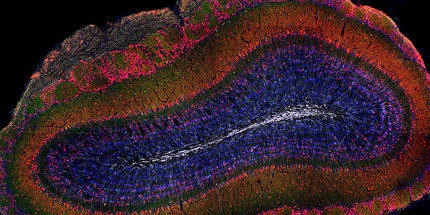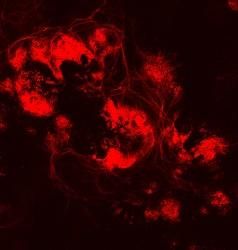New method shows that neocortical nerve cells are not renewed
Most bodily organs continually die and regrow a little at a time It takes two years for example for all the cells of the liver to be replaced by fresh ones Research from Karolinska Institutet now shows that there is one important exception to this the nerve cells of the brain remain the same throughout a person s life
Many scientists have suspected that the cerebral nerve cells lack this renewal ability However studies on apes and rodents have indicated that brain cells can reform in mammals after all including man One problem with these findings has been the research methodology as the most common way of measuring the age of nerve cells is extremely complicated especially in man and gives unreliable and controversial results
Last year stem cell researcher Jonas Frisén from Karolinska Institutet presented a way to settle the issue with help from unexpected quarters the nuclear tests of the cold war He used a variation on the well known carbon 1 method that is based on the fact that atmospheric concentrations of C1 peaked sharply during the cold war tests By comparing levels of C1 in plant and animal cells with atmospheric levels it is possible to pinpoint the exact time the cells were born
Jonas Frisén has now teamed up with Peter Eriksson s research group from Göteborg University and scientists from Australia and America to measure levels of C1 in neocortical nerve cells from all the cerebral lobes of adult individual brains They have been able to show that levels of C1 in the nerve cells from all areas of the cerebral cortex were just as high as the atmospheric levels at the time of the individual s birth Put another way no cell division had taken place in the neocortex during the person s life from infancy to adulthood
The researchers stress that the method has certain limitations For instance newly formed nerve cells might remain undetected if they have made up less than one per cent of the total number of nerve cells a person has throughout his or her life Another possibility which has been indicated by research on apes is that new cells can be born but they are short lived and die again quickly The researchers are leaving this possibility open with the reservation that newly formed cells if they have indeed lived have not survived any longer than 2 months Moreover the study rule does not rule out the ability of the cerebral cortex to form new nerve cells after having suffered pathological conditions such as stroke
Other studies show that most other tissue types have a renewal cycle of varying lengths Cells covering the inside of the stomach for instance live only a few days; the outer layer of skin is renewed every other week while the skeleton is thought to be completely renewed once every ten years or so
The research scientists are now using this new method to study new nerve cell formation in other parts of the brain in healthy and sick individuals
Original publication:< b> R D Bhardwaj M A Curtis K L Spalding B A Buchholz D Fink T Björk Eriksson C Nordborg F H Gage H Druid P S Eriksson J Frisén; Neocortical neurogenesis in humans is restricted to development ; PNAS Online Early Edition 2 6 < i>
Organizations
Other news from the department science

Get the life science industry in your inbox
By submitting this form you agree that LUMITOS AG will send you the newsletter(s) selected above by email. Your data will not be passed on to third parties. Your data will be stored and processed in accordance with our data protection regulations. LUMITOS may contact you by email for the purpose of advertising or market and opinion surveys. You can revoke your consent at any time without giving reasons to LUMITOS AG, Ernst-Augustin-Str. 2, 12489 Berlin, Germany or by e-mail at revoke@lumitos.com with effect for the future. In addition, each email contains a link to unsubscribe from the corresponding newsletter.
Most read news
More news from our other portals
Last viewed contents
USPTO issues key US patent to TiGenix for the use of adipose-derived stromal cells in the treatment of fistulas
Harvard researchers define 'good' stem cells - Establishing standards where none exist
Picornavirus





















































